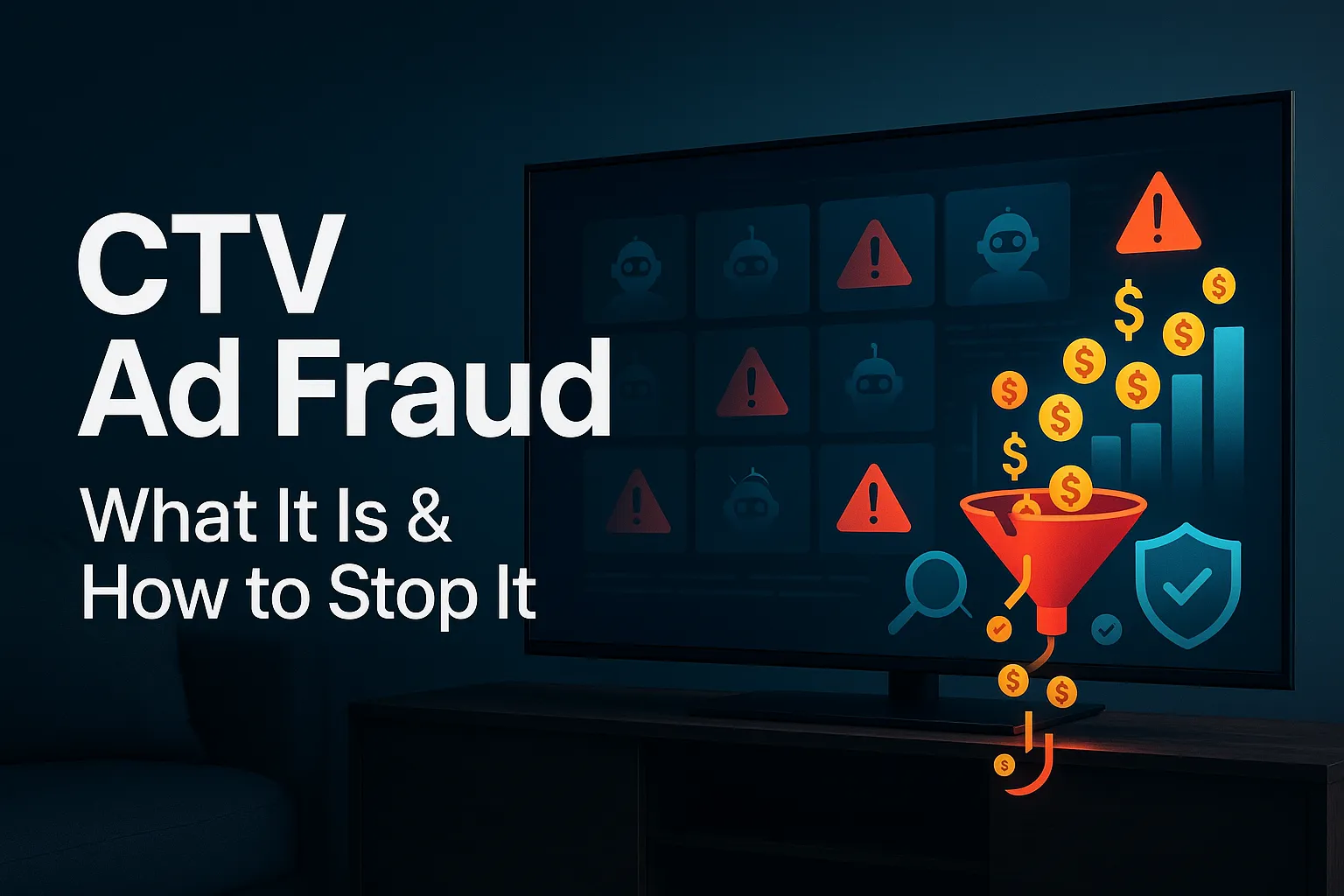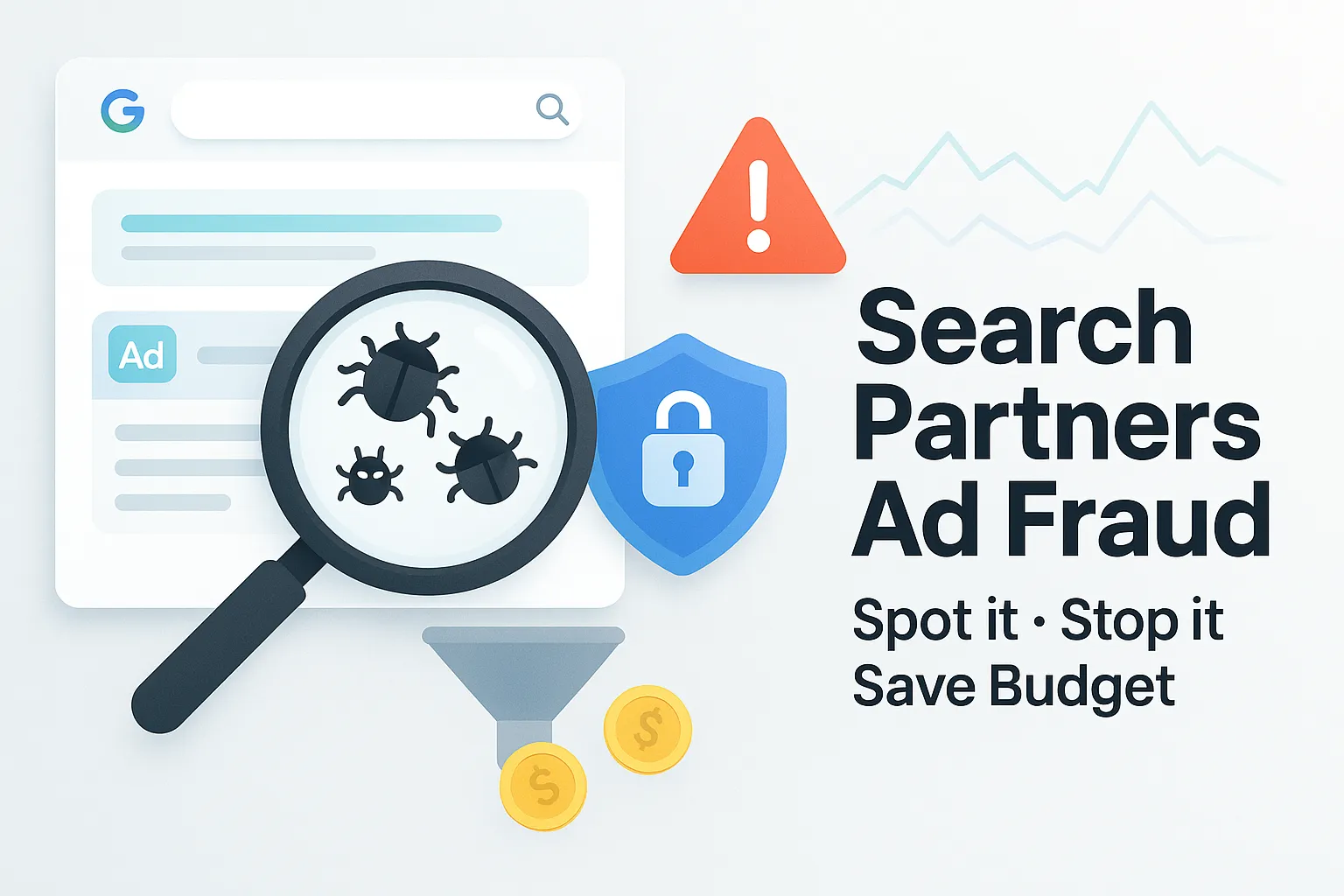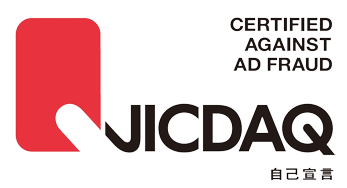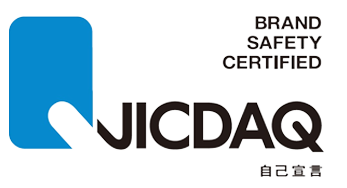6 Cybersecurity Threats of Digital Marketing

As more of your operations become exposed to the internet, you become more at risk to cyberattacks. Hacks and frauds can damage your brand, put your customers' data at risk, and harm your company.
With that in mind, let's go over the cybersecurity risks that marketers specifically need to worry about, and how to mitigate them.
Bots
Bots are everywhere on the internet. You'll know that bots are always visiting your site, and many of them have perfectly legitimate uses, like SEO ranking.
Unfortunately, some are malicious. Typically, their goal is to gather data, but you might also see them used to click your pay-per-click ads in mobile ad fraud. These are clicks you're paying for, but they're not real customers who are seeing your product.
These bots' presence can skew analytics data in any case, but in cases of ad fraud, they'll skew your data to increase a scammer's profits. Often they're inserted in digital marketing networks where partners will have to cross-check their analytics to make sure it all looks legitimate.

Image sourced from imperva.com
If the amount of traffic seems too good to be true, it probably is. A lot of visits from the same IP address is one feature that may suggest bot intervention. Use Google Analytics' filtering feature to eliminate these hits, and specialist tools to prevent ad fraud, and you'll protect yourself from this kind of cyberattack.
Threats to customer data
As a marketer, it is easy to overlook how much data your company generates every day. When your online call centers are keeping data like call recordings and transcriptions, you get a lot of personal information very quickly.
Any store of customer data is a cybersecurity risk: the more you have, the more worthwhile it becomes to hack. The best practice for marketers is to only collect the data you need, when you need it, and discard it if it's no longer needed. Customer data should be closely guarded, with passwords cycled regularly and nothing stored outside of the most secure devices.
Brand damage
Your brand is one of the most valuable assets you have. Imagine you’re selling a remote work solution, and you talk about topics such as how to improve security for business communications, or why encryption is important. Then imagine a security breach such as a DDoS attack happens. This would be catastrophic for your marketing.
But you don’t need to work in a related field for it to reduce trust - any company that puts customer data at risk will quickly gain a negative reputation.

Image sourced from dataprivacymanager.net
It’s not just data breaches that can put your reputation at risk, either. If the marketing team is sloppy about handling the keys to the brand's social accounts you could find your marketing channels filled with spam or offensive content. Make sure access to your accounts are need-to-know only, passwords are regularly updated, and add two-factor authentication (2FA) wherever possible.
Content Management Systems
Content Management Systems (or CMS for short) are a brilliant tool for marketers. Unfortunately, they’re also a prime target for cyberattacks. The more plugins or add-ons your CMS has, the worse it is. WordPress, for instance, is so powerful because of its ecosystem of plugins for features like SEO and A/B testing. But every one of those plugins has its own security risks.
If there's a security hole in a plugin that hasn't been updated for years - or a hole has been introduced by a new update - hackers could get access to every site using that plugin. Addressing this will involve you or your IT team being very deliberate about updates. You can't let plugins go without an update for too long, as they’ll lose functionality. But when any update could introduce a flaw, it's wise to hold off for an agreed-upon period before pushing updates to your critical systems.
In any case, the marketing team should be reviewing security and event management tools to monitor what's happening in their system. This means if there is some suspicious activity, the incident can be traced to one specific tool or plugin that can be removed as quickly as possible.
Additionally, plugins or third-party services you're not actively using should be deleted. By doing this, you'll be able to reduce your "attack surface": the number of points hackers could attack you at.
Like anything guarded with a password, CMSs are susceptible to "brute force" attacks, where hackers will simply have a computer guess the password thousands of times a second. When a malicious or hijacked plugin detects a password field, it's quite easy for hackers to apply pressure to that point.

Best-practices password procedures should be used everywhere in your computer network, even on seemingly trivial points like the wifi-connected printer. You'll have been told that passwords should have letters, numbers, and symbols, but a good password is useless if it leaks.
Because they’re the ones using CMS systems, marketers need to be aware of these risks. It's essential to defend yourself by creating a plan with your IT team that addresses how to react to cyberattacks on your CMS systems. This means if something does go wrong, you’ll be prepared to act when time is of the essence. Whether that’s keeping an eye on automated software testing tools, or restricting admin access to certain software, preparation is important.
Customer Relationship Management systems
Another potential attack route is through your CRM systems, the customer relationship management tools essential for doing enterprise communications at scale. These tools tend to be used by both the sales and the marketing team, so make sure they’re included in any cybersecurity discussions too!
As a list containing all of your customers, their contact details, and their relationships with you, your CRM is valuable data. When hackers used malware to access USCellular's systems, the big prize they got away with was leaking their CRM data. This data is essential for marketers, and if customers become hesitant to share it because of the risks involved? Say goodbye to many of your marketing tactics!

Once again, it’s not just a leak that’s the threat. Malware can prevent you from accessing your CRM data at all, or hackers can take your data and use software to delete it, holding the only remaining copy ransom for a huge sum of money.
Increasing the whole company's security knowledge is a good way to address the hazards related to CRM platforms. Similar to other vulnerabilities, marketers must be informed and should refrain from downloading software from shady sources.
Software installations on all computers that are used for work should be restricted. These protocols can assist in preventing malware from infecting your system and unauthorized access from occurring. Additionally, a network that takes regular "snapshots" - backups of the whole system to be stored off-site - is able to shrug off ransomware threats because you can just rewind to the most recent save.
Email threats
Finally, there's email: the tool you use every day for the most basic communication, and the biggest source of cyberattacks there is: 65% of attacks use phishing emails as the way in.
While stats like that have brought attention to the importance of phishing awareness, remote work has moved so much communication online that several businesses are reporting an increase in cyber attacks.

Email was built for the high-trust internet of the 1970s, and its security hasn't fundamentally improved since. It's easy for scammers to spoof email addresses and run the phishing scams you see in your spam folder every day. When this is where you do all your business, that's a huge cybersecurity threat for your business.
Phishing attempts can be made less likely by teaching your staff, particularly marketers, to carefully examine information requests and confirm the legitimacy of a request. It’s worth doing regular testing - emulating a phishing email - and recording who falls for it in order to implement targeted training.
Staying aware of cybersecurity threats
Whether you're selling physical products or virtual receptionist services, cybersecurity is an essential consideration for marketers. Bots, brand damage, and essential tools like CMS, CRM, and email are all potential sources of threats to stay aware of, so make sure your cybersecurity training is up-to-date!
Frequently Asked Questions about Cyber Security Digital Marketing
How can cybersecurity be maintained in digital marketing campaigns?
Maintaining cybersecurity in digital marketing campaigns involves several best practices. Marketers should regularly update their Content Management Systems (CMS) and plugins to patch any security vulnerabilities, limit the collection and storage of customer data to what is necessary, use strong, regularly updated passwords, and implement two-factor authentication (2FA) wherever possible. It’s also important to provide regular cybersecurity training for all staff involved in digital marketing to recognize and prevent potential cyber threats.
What are some potential cyber threats that can affect digital marketing channels?
Digital marketing channels can be compromised by a range of cyber threats, including malicious bots that can skew analytics or commit ad fraud, threats to customer data through data breaches, brand damage from compromised social media accounts, vulnerabilities in CMS due to outdated plugins, attacks on Customer Relationship Management (CRM) systems, and phishing attacks via email marketing. These threats can all potentially lead to financial losses, loss of customer trust, and damage to the brand’s reputation.
What should digital marketing agencies do to protect customer data?
Digital marketing agencies should adopt stringent security measures such as encryption to create an encrypted tunnel for sensitive data, enforce strict access controls, regularly cycle passwords, and ensure that any sensitive information is stored on secure, compliant devices. They should also conduct regular security audits and have protocols in place to quickly respond to any data breaches. Educating employees about information security and encouraging the use of strong passwords are also key steps.
How can marketers prevent bots from affecting their marketing campaigns?
Marketers can prevent bots from affecting their marketing campaigns by using specialized tools designed to prevent ad fraud and by implementing filters in analytics tools, such as Google Analytics, to remove illegitimate traffic. Cross-checking analytics data with partners is also crucial to ensure that traffic is legitimate. Monitoring for excessive traffic from the same IP address can help identify bot activity early on.
What steps should be taken to safeguard a brand’s social media accounts from cyber attacks?
To safeguard a brand's social media accounts from cyber attacks, marketers should limit account access to key decision makers, update passwords regularly, and apply two-factor authentication (2FA). They should also conduct regular security check-ups and be vigilant about any suspicious activity on their accounts to act swiftly in case of any security breaches.
Why is email considered a significant cybersecurity risk in the digital age, and what can be done to mitigate this risk?
Email is a significant cybersecurity risk because it was designed for a high-trust environment and hasn't fundamentally improved in security, making it vulnerable to phishing attacks. To mitigate this risk, companies should educate their staff, especially digital marketers, to recognize phishing attempts, verify information requests carefully, and use secure email practices. Conducting regular phishing simulations and targeted training for those who fall for them can also be beneficial.
In what ways can cybersecurity solutions aid digital marketers in enhancing their marketing strategy?
Cybersecurity solutions can aid digital marketers by protecting marketing campaigns from potential cyber threats, thereby preserving the integrity and trustworthiness of the brand. These solutions can also help in ensuring the safety of sensitive data, which in turn helps in maintaining customer trust and complying with various privacy and compliance requirements. By integrating cybersecurity into their marketing strategy, marketers can build credibility with their target audience and avoid the costly consequences of data breaches.
How frequently should cybersecurity measures be reviewed by digital marketing agencies?
Cybersecurity measures should be reviewed regularly, at least quarterly, or whenever there is a significant change in the digital infrastructure or the threat landscape. Additionally, it's crucial for digital marketing agencies to stay up to date with the latest security threats and ensure their security protocols evolve to counteract new forms of cyber attacks. After major campaigns, a review can also be beneficial to ensure that new marketing efforts do not introduce vulnerabilities.




















